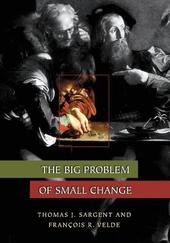
|
The Big Problem of Small Change
Paperback / softback
Main Details
| Title |
The Big Problem of Small Change
|
| Authors and Contributors |
By (author) Thomas J. Sargent
|
|
By (author) Francois R. Velde
|
| Series | The Princeton Economic History of the Western World |
|---|
| Physical Properties |
| Format:Paperback / softback | | Pages:392 | | Dimensions(mm): Height 254,Width 178 |
|
| Category/Genre | History of specific subjects |
|---|
| ISBN/Barcode |
9780691116358
|
| Classifications | Dewey:332.494 |
|---|
| Audience | | Professional & Vocational | | Tertiary Education (US: College) | |
|---|
| Illustrations |
21 tables. 9 halftones. 42 line illus.
|
|
Publishing Details |
| Publisher |
Princeton University Press
|
| Imprint |
Princeton University Press
|
| Publication Date |
23 November 2003 |
| Publication Country |
United States
|
Description
The Big Problem of Small Change offers the first credible and analytically sound explanation of how a problem that dogged monetary authorities for hundreds of years was finally solved. Two leading economists, Thomas Sargent and Francois Velde, examine the evolution of Western European economies through the lens of one of the classic problems of monetary history--the recurring scarcity and depreciation of small change. Through penetrating and clearly worded analysis, they tell the story of how monetary technologies, doctrines, and practices evolved from 1300 to 1850; of how the "standard formula" was devised to address an age-old dilemma without causing inflation. One big problem had long plagued commodity money (that is, money literally worth its weight in gold): governments were hard-pressed to provide a steady supply of small change because of its high costs of production. The ensuing shortages hampered trade and, paradoxically, resulted in inflation and depreciation of small change.After centuries of technological progress that limited counterfeiting, in the nineteenth century governments replaced the small change in use until then with fiat money (money not literally equal to the value claimed for it)--ensuring a secure flow of small change. But this was not all. By solving this problem, suggest Sargent and Velde, modern European states laid the intellectual and practical basis for the diverse forms of money that make the world go round today. This keenly argued, richly imaginative, and attractively illustrated study presents a comprehensive history and theory of small change. The authors skillfully convey the intuition that underlies their rigorous analysis. All those intrigued by monetary history will recognize this book for the standard that it is.
Author Biography
Thomas J. Sargent is Donald Lucas Professor of Economics at Stanford University and Senior Fellow at the Hoover Institution. A pioneer of the rational expectations school of macroeconomics, he is the author of "The Conquest of American Inflation" (Princeton), "Bounded Rationality in Macroeconomics", and "Dynamic Macroeconomic Theory". Francois R. Velde is Senior Economist at the Federal Reserve Bank in Chicago and Lecturer in Economics at the University of Chicago.
ReviewsWinner of the 2003 for Best Professional/Scholarly Book in Business Management & Accounting, Association of American Publishers "The core of [the] story is a mathematical model, in this case one that captures possible solutions to the small-change puzzle, including the correct one... For centuries, authorities sensed that economic health depended on the steady, predictable availability of currency. But they did not understand how to realize this goal. Messrs. Sargent and Velde deserve credit for revealing how the correct model came into being... More than a penny for their thoughts."--Paul Podolsky, The Wall Street Journal "This fascinating new history of money shows that the key ingredients of a sound currency were identified in Europe hundreds of years ago. The mystery is why, even today, so many governments fail to put this knowledge to work."--The Economist "This elegantly written, scholarly work will appeal to those interested in financial history or monetary theory."--Publishers Weekly "[The authors'] design serves as a temple for the conduct of research in economics as an empirical science. They have done it just right. Their book is strongly recommended."--Choice "This is an important and wide-ranging book, which will reshape the way in which we think of the origins of modern money and modern monetary theory. It is ... so well organized that the lay reader can get the message simply by reading the fascinating narrative and taking for granted the mathematical account of the standard formula, presented in two chapters at the conclusion. It is also splendidly illustrated and beautifully produced."--Harold James, Times Literary Supplement "A remarkable book... The Big Problem of Small Change is an impressive piece of scholarship that should be of interest to most economists, not just to economic historians. It offers a coherent model of money that helps explain a recurring problem that can arise with a commodity of money system and that provides the basis for understanding a solution to this problem."--Arthur J. Rolnick and Warren E. Weber, Journal of Political Economy "[H]istorically-minded readers will have traversed an insightful and entertaining exploration of European monetary history and of the writings of early monetary thinkers ... with as much enjoyment in the reading as the authors seem to have taken in the research and writing."--Robert W. Dimand, History of Economic Ideas
|